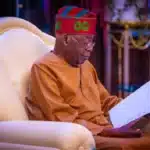The International Court of Justice (ICJ), a branch of the United Nations, is currently hearing a case brought by South Africa against Israel.
South Africa accuses Israel of committing genocide against Palestinians in Gaza.
South Africa is also requesting that the court order Israel to cease its military operations in the region. It is important to note that the ICJ will only provide an opinion on the genocide allegation, as this is not a criminal trial.
However, the case is being closely monitored by many. Israel has strongly denied the accusation, stating that it is unfounded.
Outside the ICJ’s Peace Palace, there were tense moments as Dutch police worked to keep Palestinian and Israeli supporters separated.
Palestinian supporters, waving flags, gathered outside the ICJ, demanding a ceasefire. Meanwhile, Israeli supporters displayed images of hostages still being held in Gaza on a screen.
South Africa will present its case on Thursday, and Israel will present its defense on Friday.
In its submission, South Africa says Israel’s actions “are intended to bring about the destruction of a substantial part of the Palestinian national, racial and ethnical group”.
It says Israel’s actions include “killing Palestinians in Gaza, causing them serious bodily and mental harm, and inflicting on them conditions of life calculated to bring about their physical destruction”.
It urges the court to impose “provisional measures” as soon as possible, including Israel ceasing all military activity in Gaza.
The International Court of Justice is the United Nations’ highest court, with its headquarters in The Hague, Netherlands. Its verdicts are potentially legally obligatory on ICJ parties, including Israel and South Africa, although they are not enforced.
In 2022, the court ordered Russia to “immediately suspend military operations” in Ukraine, but the injunction was ignored.
Under international law, genocide is defined as committing one or more actions with the purpose to completely or partially destroy a national, ethnic, racial, or religious group.
Unlike the International Criminal Court (ICC), the ICJ cannot prosecute people for crimes such as genocide, but its opinions are respected by the UN and other international agencies.
On Wednesday, South African President Cyril Ramaphosa said: “Our opposition to the ongoing slaughter of the people of Gaza has driven us as a country to approach the ICJ.”
Israeli President Isaac Herzog called the accusations “atrocious and preposterous”.
“We will be in the International Court of Justice and we will present proudly our case of using self-defense under humanitarian law,” he said.
He added that the Israeli army was “doing its utmost under extremely complicated circumstances on the ground to make sure that there will be no unintended consequences and no civilian casualties”.
The International Court of Justice might respond soon on South Africa’s request that Israel pause its military assault, but a final decision on whether Israel is committing genocide could take years.
William Schabas, a professor of international law who oversaw a UN commission studying Israel’s battle with Hamas in 2014, believes the court has a low standard for issuing an injunction against Israel.
He told the BBC that South Africa needs to “demonstrate that there are elements that support its case”, for the court to issue an order, although this would not involve “making a definite decision as to whether or not genocide is actually taking place”.
South Africa has been very critical of Israel’s military action in Gaza, and the ruling African National Congress has a long history of support for the Palestinian cause.
It draws similarities to its battle against apartheid, a regime of racial segregation and oppression imposed by South Africa’s white-minority government against the country’s black majority until the first democratic elections in 1994.
According to the Hamas-run health ministry, more than 23,350 Palestinians have died in Gaza since the conflict began on October 7, after Hamas’ strikes on southern Israel. During the attacks, over 1,300 people were killed, the majority of whom were civilians, and approximately 240 others were held hostage.





